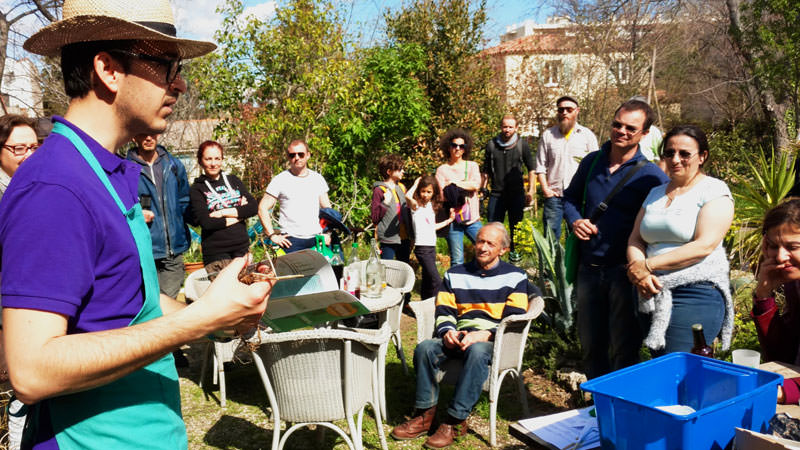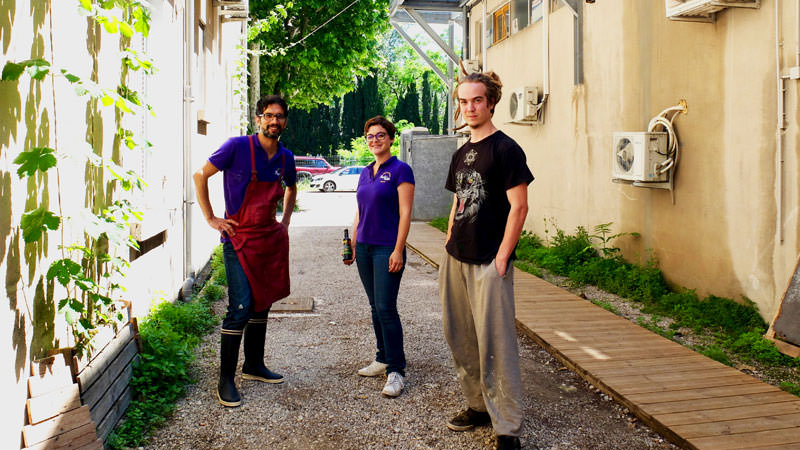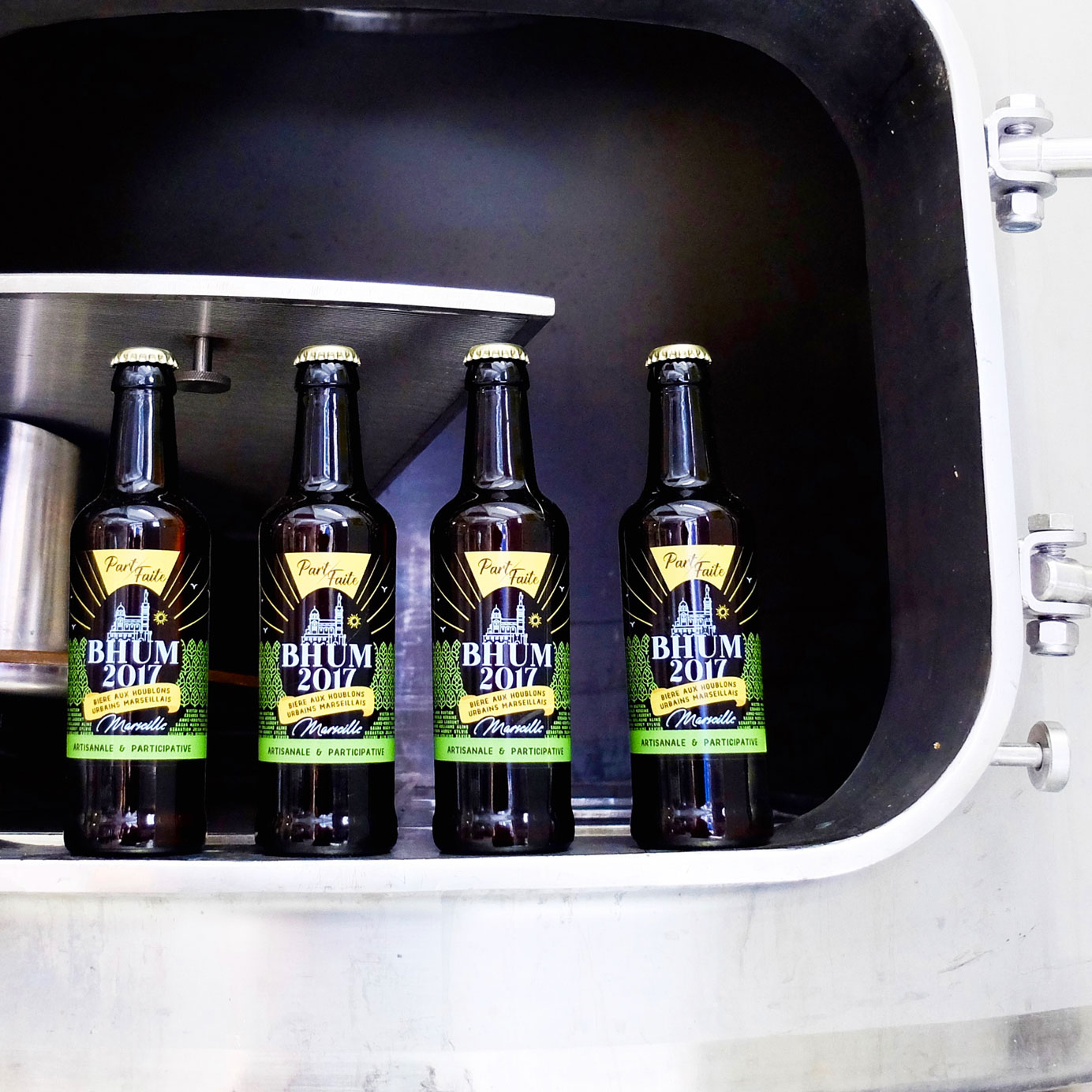Though two people officially own Part Faite, the Marseille microbrewery chugs on community.
Born from a successful crowdfunding campaign, Part Faite is run by Gonzalo and Laure Araque-Goy, a couple whose love of beer is only surpassed by a fierce love of community. Gonzalo and Laure launched their line of three organic brews by enlisting 300 beer lovers in 18 tasting sessions of 16 beers. The oil in their fermenting tanks is recycled from local restaurants. Leftover chaff, or grain husks, go to a boulangerie for beer bread, or to a nearby farm for animal feed.
Even the microbrasserie’s name promotes togetherness. “Part” stems from the communal “participation” of all those involved in making their artisanal suds. “Fait” is a derivative of the French verb “faire,” which means “to make.”
There’s a dash of the aspirational, too. “Parfait is perfect in French,” Laure says with a wink.
When the duo wanted to try their hands at hop farming, they naturally came up with a cooperative-style solution: Give seedlings to their community to cultivate in their backyards and on their balconies. The fruits of their neighbors’ labor, the hop cones, could then be bottled into a special beer: Bière Houblon Urbain Marseillais, or Urban Marseille Hops Project. It’s affectionately acronymed BHUM (pronunciation: “boom”).
Part of BHUM’s mission is to brew beer, of course; but it’s also a way to connect citizens, promote urban farming, and teach others how beer is made. This final, pedagogical aspect is important to Laure and Gonzalo. They had discovered their friends and neighbors didn’t know the green, olive-sized cones were hops when they displayed them at farmers’ markets. What better way to learn than by growing the plants themselves?
The couple believe local houblons, or hops, are a pressing need. As microbreweries multiply, “the organic houblon market is almost tapped out,” Laure says, explaining that “artisanal beer uses more hops than their industrial counterparts.”

To alleviate this strain, a collective of fellow southern French brewers, La Bière de Provence, is researching how to farm in the south. Alsace, in northern France, is the Pacific Northwest of French hops production. The BHUM project is also an experiment on growing hops in a city and a Mediterranean climate–whose data Part Faite is happy to share.
The thirst for geographically desirable hops also stems from the importance of terroir. Like grape vines, “if you put a hop varietal in different soil, it will have a different taste,” Laure says.
Hops are one of the four fundamental ingredients of beer, along with water, malt, and yeast. The cone-shaped flowers of the female hop plant impart bitterness (see India Pale Ales, American Pale Ales, and New England IPAs) and help stabilize beer by protecting against microorganisms. Their essential oils are packed with over 250 chemical components, bursting with flavor and aromas.
“Without them, it’s not legitimately beer, but cervoise,” Laure says. Cervoise is beer’s ancestor, an ale-barley wine of the Middle Ages that begat the Spanish word for beer: cerveza.
The seed for crowd-sourced hops was planted in 2016 when Gonzalo and Laure met Julien Girardon, the rooftop garden guru behind Abricotoit, at an entrepreneur incubator.
Upon discovering they shared overlapping interests in “organic ingredients, local distribution, and urban agriculture,” Laure says, the trio decided to give hops farming a go.
At Julien’s dad’s house, they tested three varieties ideally suited for the warm, sunny Mediterranean climate — Cascade, Chinook, and Glacier. They benefited from Julien’s PhD in plant biotechnology, Laure says. The first two plantings flourished so well they couldn’t help but extend the experiment’s reach.
They put a call out on Facebook in January 2017 to see who might be willing to adopt hop plants. No fewer than 47 people responded, a mix of Part Faite’s beer geeks, Abricotoit’s seasoned gardeners, and locals eager to join a group endeavor. The all-ages amateur hops growers included 20-something roommates, families with young kids, and retired farmers from “all 16 Marseille arrondissements, 60 kilometers as the crow flies,” beams Laure.
“I wanted to participate in a project to cultivate an agricultural product, transform it, and be able to benefit as well, “ says one participant named Violane. She farmed with her family in their ground-floor apartment garden in the heart of the city.
In the project’s inaugural year, 150 hop plants sprouted 5 kilograms of cones. Gonzalo transformed them into 1,000 liters of Berliner weisse. In 2018, an additional 73 aspiring growers have signed up.
Now with 120 hops farmers and 250 plants to play with, Part Faite is aiming for two to three different beers, including a hop-driven style, like an IPA, and a fresh hop beer. The latter takes advantage of the plants’ proximity since the cones need to be utilized within 24 hours of harvest.
The plants are purchased from Lupulina’s Jordi Sánchez, who farms “craft hops for craft beer” in Catalonia. Though it strays from Gonzalo and Laure’s “made in France” commitment, Sánchez shares their same ethos, small size, and eagerness to experiment. Plus, he is able to guarantee the organic plants’ health, and Catalonia’s climate is more similar to Marseille’s than that of Alsace.
To become a houblonnier, or hops farmer with BHUM, no farming experience is necessary. All you need is a minimum of one square meter of land. In Marseille’s diverse landscape, the makeshift hops plots take root on high-rise terraces above the Mediterranean to backyard gardens in working-class neighborhoods.
One participant, Guy, has his hops weaving around a metal fence in an overgrown plot beside his Le Corbusier-designed apartment building. He was lured to the project by his agricultural background and his palate. Unlike many French, he says, he “prefers beer over wine.”
In tune with Part Faite’s welcoming warmth, people can participate even if they don’t have land by “sponsoring” hops grown at a community center, a co-working space, or at Tour des Pins, the farm.

When asked if hops are easy to grow, participants resoundingly reply, “yes!” A cousin of cannabis, hops mostly need sun and room to climb — as clued by their Latin name, humulus lupulus. The hops (humulus) got their wolf (lupulus) moniker because the plants appear to “devour the forest as they wind around trees,” Laure says. This explains the wolf-centric names of breweries and beers like Little Wolf from Zero Gravity in Burlington, Vt., and France’s Brasserie de 3 Loups.
Hops aren’t picky about what they cling to, whether wall, wire, or trellis. Even in the most mediocre conditions — lack of abundant sunlight, poor soil quality — the vines stretch high. Outside Part Faite’s small brewery, its own vines ascend a concrete wall, then extend overhead, providing pops of green in the nondescript alleyway.
The hop farmers are assisted throughout the community-supported beer project. They are given comprehensive guides explaining hops’ role in beer, what the planting process entails, and practical intel on where to plant (in south-facing sun and hidden from the local Mistral wind) and when you know that the cones are ready to be harvested — they feel like “dried leaves” and sound like “paper crumpling” in your hands.
BHUM also has a strong social component. Hops growers can share updates, post pictures, and ask questions — like how to deal with the prevalent Marseille snails. Julien manages the forum, happy to share his expertise in all things horticultural.
Offline, the houblonniers gather periodically for apèros, the happy hour that is as integral to Provençal culture as baguettes are to France. There are learning sessions to get a taste of hop farming and festive parties to taste the beer their hops flavored. Even the labels’ design, which proudly listed the names of all participants last year, is a team effort, the winner chosen via an online poll. Growers are compensated with three to 24 bottles, depending on their hops harvest.
“What made the biggest mark was to have participated in a joint adventure,” Julie and Aubin, a couple who grew hops among fruit trees in their 150-square-meter backyard, tell me.
It’s the community spirit that makes BHUM so special. It helps to overcome Marseille’s socioeconomic differences, uniting its citizens with an easy-drinking beverage. It gives them a purpose to rally behind and hands-on lessons about how beer goes from plant to glass. And, if the hardy hops themselves are any indication, this project will flourish for years to come.
